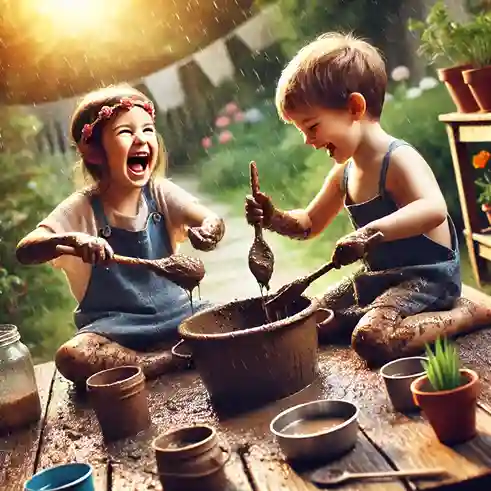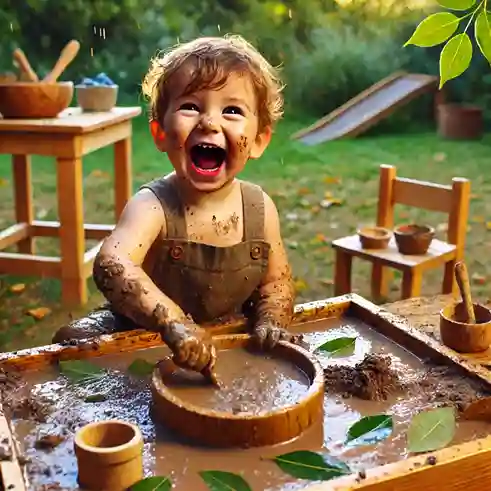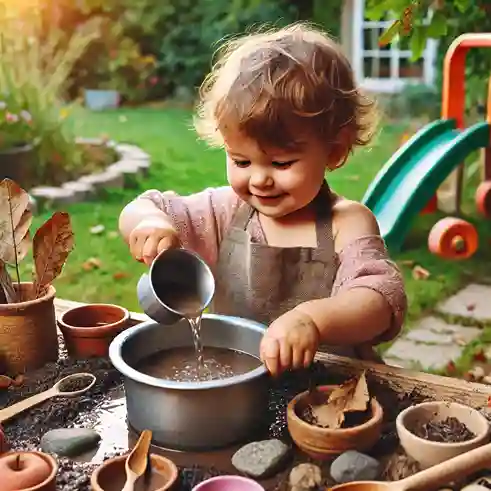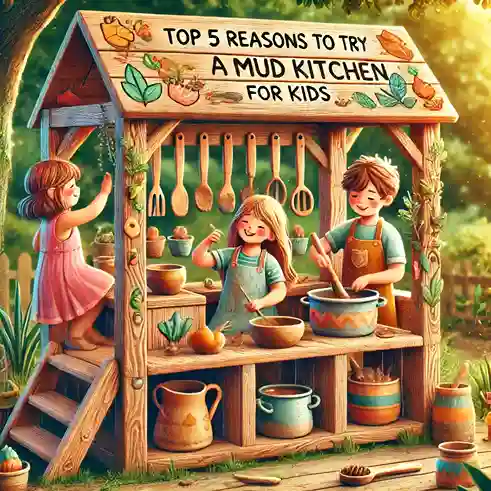Introduction to Mud Kitchen for Kids
In recent times, Mud Kitchen for Kids are increasingly considered as an alternative form of outdoor play which has children’s imaginary and creative hands on experience. These purposefully constructed play spaces encourage children to freely and creatively use a natural resource that is earth, mostly in the form of clay. Mud kitchens also enable kids to combine, mash, and shape things up, which brings not just creativity but also enhances cognitive and social growth.
Children enjoying using mud kitchens have increased rapidly because parents and educators have realized the significance of outdoor activity. This growth has been made possible due to an increased awareness regarding the developmental advantages of exposure to natural environments. Children playing in these kitchens get a chance to touch and feel their surroundings and engage in the pleasing and instructive activities. Through such processes of searching and pretending, a child is able to gain coordination of movements and love for the environment.
In addition, mud kitchens stimulate social interacton as kids frequently join forces to make their little works of art. This socializing element is quite crucial in as far as the development of social skills, teamwork and friendships is concerned. As the screen time and indoor restrictions become a constant companion, mud kitchens seem to be an appealing option for parents which helps in nurturing their kids in touch with nature.
Mud kitchens are built from used products making it easier to create them to suit different outdoor area which accommodate a variety of families and learning institutions. Their flexible design makes it possible for children to play alone or in groups so that the child is able to use a variety of creative scenarios in the play. In summary, it can be stated that the combination of mud kitchens makes them fun and education for the children, caregivers and educators.
Encouragement of Creativity and Imagination
A mud kitchen is an innovative solution for outdoor play that encourages creativity and imagination in children. Offering children the possibility to play where there are natural resources like mud, leaves, water, and stones, a mud kitchen allows children to participate in pretend play. Here, children could be anything from top-rated chef making French cuisine to an explorer mixing together random stuff in their pots and pans.
This kind of outdoor play gives children an opportunity to prepare any dish from their fantasies. Children are free to use their hands to create whatever they wish to because they are no longer restricted by the use of fixed miniature toys. Elements such as mud, twigs, and flowers could be used to make ‘soup’, or ‘cakes’ or even ‘salads’, which nurtures the love for nature in children while making sure their creativity is unbridled. For example, one child could decide to create a ‘vegetable stew’ with grass, sticks, and water, which not only is physically active but also mentally stimulating because the child decides how they will construct the meal.
Role-playing happens to be another significant aspect of a mud kitchen. Children have the tendency to role-play adult functions of their everyday life routine. For example, when the child stirs an imaginary pot, she also tells the story about her restaurant where she takes the order and puts in more ingredients, which indicates a child’s imagination and the language and social development. Such actions compose a certain story and they encourage several other practices such as critical and analytical skills because the child is trying to resolve problems during the playing period. Mud kitchens are extremely appealing tools for creative development which is a crucial factor for a child’s growth because they foster imagination, stories, and role-playing.
Improving gross and fine motor skills is the second hands of benefits brought about by engagement in mud kitchens. Activities such as mixing, spinning, and combining enable the child to enhance the required coordination of such types of movements. Mud mixing, stirring and pouring, as well as stuffing cups or spoons encourage fine motor skills development, which involve hand and finger smaller and more precise actions. Thus, these help in mastering greater hand-eye coordination and dexterity, which are both critical to physical growth and development.
For instance, core muscles and balance are developed as materials are picked up, mud is poured into containers, and different ingredients are reached out. These are some of the activities in which children perform large gross movements that have also been emphasized as very critical in the general development of a child. This encourages a form of physical exercise that is not only fun but essential in the children development.
Other activities the children can do at the mud kitchen such as pouring water into different containers or pots or mixing mud with leaves can help in enhancing their motor skills as they are required to adopt various grips and grips at the kitchen. Each time a child moves a spoon or throws water during our lessons they are beginning to interpret the task better while getting engaged in motor and sensory play. The primal understanding that a child gains through exploration is accompanied with the possibility of practicing creativity and autonomy while actually performing physical activities in the Mud Kitchen for Kids.
A Mud Kitchen for Kids is an extension of the child’s imagination and aids in their physical development as it serves as an outlet for their boundless energy and helps them in developing strength and coordination skills.
Encouraging Social Engagement

The Mud Kitchen for Kids is an excellent tool not only for play but also for social interaction among children. With advancing technology and increased individual play, they provide a new outside milieu for children to use their imagination while playing out roles in a realistic world, sharing toys and playing together. This play that is not structured in such a way encourages bonding and communication between the children, which is essential for one’s social growth.
Anytime the children are gathered around a mud kitchen, they tend to engage in cooperative play naturally. For example, children may first make use of some of the available tools, suggest varying creation ideas or agree on what to ‘cook’ while pretending to be chefs in the kitchen. The concept of the kitchen thus accommodates making friends as well as learning to share, argue and empathize with play mates. As children interact with each other in this manner, they grasp the concept of belonging which is essential at their age.
Furthermore, Mud Kitchen for Kids arealso Wonderful settings for role play scenarios that can evolve into great dialogues and vivid stories. Children tend to build narrative around their kitchen activities, thus developing their speaking abilities and increasing vocabulary. They pick up the skills of articulating their ideas, inquiring, and listening to their mates, which are important elements of communication.
Possibly the most significant aspect of a Mud Kitchen for Kids is the ability for children to self-direct their individual play. This ability fosters children to lead in their interactions and helps develop leadership skills. Moreover, as children construct their play experiences, they become more socially competent. The Mud Kitchen for Kidsoverall serves a great role of building social relations, communication, and cooperation making it a great suitable outdoor play resource for children.
Connection to Nature and Environmental Awareness

Children are surrounded by the outdoor play structures in the form of Mud Kitchen for Kids, which allow children to interact with nature in a whole different way. Nature is incorporated into these structures through mud, water, and plant material. It provides children with a hands-on experience of their environment. Activities like mixing mud, sculpting, or pretending to cook and serve food offer children a sense of tactile awareness for raw materials. Such active involvement is of great significance in forging a bond with the environment and the world, in turn, increasing respect and curiosity towards this connection.
In addition, Mud Kitchen for Kids generally use some sticks, leafs’, and stones from the area around, meaning they facilitate children’s cognition about the space around them. Such quest not only enriches sensory experiences but also educates children on some ecological concepts, particularly the importance of life diversity and the relationship between different natural systems. Through these playful interactions, children are able to understand how fragile nature is and begin to appreciate its balance in their little minds which helps in raising awareness concerning environmental care.
Concrete experience has been found to increase children’s appreciation of their surroundings. While outdoor play, such as mud play within the constraints of a Mud Kitchen for Kids enhances children’s interest in the natural world as well as critical and problem solving skills. Children are encouraged to work with natural materials and see what happens which helps them to understand cause and effect more readily in relation to nature.
With the continued use outdoor experiences there is a greater probability that children will have a more positive attitude towards environmental appreciation and responsibility. In the increasing technologically oriented world, the direct contact with the elements through Mud Kitchen for Kids becomes of great importance. All in all, this engagement with nature not only enhances childhood play but also paves the way for the younger generations to be educated caretakers of the planet.
Sensory Exploration and Learning Through the Mud Kitchen
A Mud Kitchen for Kids is a fantastic outdoor play option as it allows the children to be immersed in a complex sensory rich environment. By interacting with mud, their fingers feel different sensations. For example, the moist and sludgy mud is in contrast with dry twigs or pebbles, which adds to the fun of touch, making them more inquisitive and wanting to discover more. All of these activities that involve the mud, not only supplies fun, but also allows cognitive developments including fine motor skills as they pour mud and manipulate it into different objects.
Apart from texture, Mud Kitchen for Kids such as this allow children to have a variety of , scents and even colors. The scent of damp dirt can connect you to nature while adding other organic ingredients like leaves, flowers, or even herbs can provide more fragrant smells. Moreover, the pretty colors of these components aid in vision, which is more beneficial to lateral growth. Moreover, each new experience of interacting with materials expands the child’s understanding of the world around them and increases their sensory dictionary.
According to studies done on the topic, sensory play, in particular, is key to development processes such as critical and problem-solving. For example, when playing in a Mud Kitchen for Kids, children are commonly seen pretending to cook with mud and other materials, as their decisions require them to come up with creative scenarios. Making such decisions like what ingredients to use in a “recipe” allows them to engage in planning as well as simple science as the children measure and combine ingredients.
To sum it up, the benefits of sensory exploration that come from using Mud Kitchen for Kids extend well beyond that, as they are also suitable for educational purposes and contribute to a child’s growth through play. Children’s ability to learn from experience is greatly aided by this rich sensory context, enabling the acquisition of necessary elements for the process of learning and growth throughout a child’s life.
Encouraging Undefined Play and Self Sufficiency

Undefined play is a key component in the development of a child and Mud Kitchen for Kids are a perfect place for children to practice this kind of play. Unlike traditional play structures that exist with the intent to allow for no creativity, Mud Kitchen for Kids give children the freedom to make their own games. This absence in the structure allows the child to be creative with natural elements and use them in making up new games, projects, or sensory play.
As they play in mud kitchens, children are free to decide on the materials they will use as well as how to use them. This making of decisions is very crucial in improving their self-reliance. They learn to control their play by evaluating the situation and deciding on what to do and how to resolve issues at hand all by themselves. For example, the decision as to whether or not to combine mud with water, leaves, and other organic materials not only favors the children but also stimulates their critical thinking as they would be imagining the result of their action.Controls the way they play. In the play settings of the children, where there is less Almost no control, children learn how to understand their peers by learning how to share their toys and organize their play around their collective ideas. With barely any guiding rules or goals,Mud Kitchen for Kids provide free play environments that offer children opportunities to pursue interests that reinforce their identity and sense of agency.
To sum up, Mud Kitchen for Kids can be designed to encourage individual and group endeavors while allowing for imaginary activities to take place. Furthermore, these play zones are an invaluable source of creativity and self dependence along with decision making processes as children get to run the activities. It is essential for a child’s overall development to spend time in such play opportunities as well.
Mud Kitchen for Kids: Fun and Accessible
Over the past few years, Mud Kitchen for Kids have become increasing popular among many families because of how they can easily be constructed, providing an excellent solution for outdoor play. Customized clay kitchens are a cost effective alternative, which is one of the best features. People can adapt the structure and configuration according to the size of the space available at their yard or the community area, ensuring that every installation is different and meets the desired specifications.
There are a number of ways in which a Mud Kitchen for Kids can be constructed but also modified and personalized by the families. For many households, reclaimed wood, old pallets, or even items from local swap meets are good options. This not only helps in controlling the cost, but also saves a lot of wood. Some might also buy Mud Kitchen for Kids kits that are being sold in the markets. These usually have the necessary parts included like a sink, and working countertops used for the outdoor kitchen. This comes in handy for those, who are short on time and resources to build their own Mud Kitchen for Kids fully.
There are also Mud Kitchen for Kids that are rather basic and require minor assembling, to advanced ones that can have a number of cook pots and stoves. With this form of variability, a family does not have to look for a bigger yard or a much bigger patio to make a Mud Kitchen for Kids that provides multiple kids the opportunity to indulge in creative plays without worrying about the space that is available.
In addition, Mud Kitchen for Kids can be found in almost all communities. Children’s outdoor recreational centers aimed at fostering interaction and cooperation among children can incorporate these kitchens. Such inclusivity allows for various groups to engage in sensory experiences and imaginative play which reinforces the idea that Mud Kitchen for Kids can be quite useful regardless of one’s social standing. In summary, due to their affordability and ease of construction, Mud Kitchen for Kids create a unique opportunity for many families and communities to enhance their children’s outdoor playing experiences.
Conclusion: Never Ending Effect on Child Growth
The last of these was about creating a safe environment for the children, and in order for this bull’s eye to be achieved, watchers have to forget the fact that Mud Kitchen for Kids exist in the play area. An environment which is devoid of supervision allows children to navigate through various risks and thus gain a sense of autonomy. This is reality’s equivalent of dreaming as children would then be able to reconstruct reality according to their own schema and bring their ideas into existence.
Additionally, Mud Kitchen for Kids foster imagining and wondering based on their rich clay-mud content. Children use their senses to contact the world around them as they interact with the different textures, smells, and properties of mud. This type of sensory engagement is important during early childhood, and it aids in cognitive processing and comprehension of the world around them.
At the same time, confidence levels can also be apparent in the friendly surroundings of the Mud Kitchen for Kids. When children play together, they begin to communicate with each other during interactions which enable them to build up social interactions. They also learn to play together, which teaches them to have empathy, understanding, and conflict and resolution strategies, which forms their social skills.
In addition, children are also active in physical activities while working in Mud Kitchen for Kids, thus encouraging their physical fitness. Activities such as digging, mixing, and pouring strengthen their muscles and improve their balance. And children’s contact with the environment is also of value, because by being in contact with nature, children learn to take care of and respect the environment.
To sum up, for every parent or guardian, learning how to build a Mud Kitchen for Kids is definitely an investment that will bear plenty of returns due to the fact that it facilitates outdoor creative play and growth of children in many aspects. Such an offer enables one to instill imagination, senseof – taste and touch, socialization, motor skill roles, and ecological aspects in the child. It’s a great idea for a child turning to outdoor play. One day that may be one solution that helps children more and grow better.

